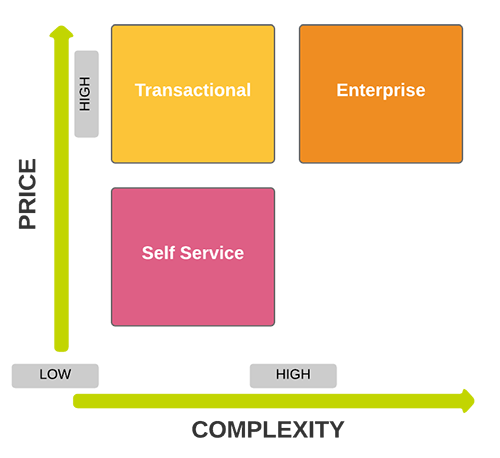Developing a successful software as a service (SaaS) solution that appeals to the masses and transitioning towards a SaaS business model can be a daunting task. However, also putting together a team of qualified and experienced individuals to market the product can be just as challenging. Selecting the right salespeople for a SaaS business is a critical undertaking and can directly influence how well a product sells. Keep the following information in mind when building and scaling an SaaS sales team.
Understanding The SaaS Sales Process
Having a successful SaaS team involves more than just finding the right candidates for the job; it also requires developing a sales strategy that works. The sales process refers to a repeatable set of actions that a salesperson can follow to turn a prospective buyer into a customer. This formula serves as a blueprint which provides the sales team with the most likely path to a sale.
The sales process not only needs to be effective on the company’s side but also on the buyer’s end. From a buyer’s perspective, the sales process reflects the journey they take with a particular company, beginning with an interest in a product, to the final sale. The primary goal on the buyer’s side is to obtain the product they want while also receiving good customer service.
Many great salespeople understand the benefit of shortening the sales process. A shorter sales process allows businesses to earn larger profits by selling more products in a shorter amount of time. Shorter sales cycles can often be achieved through the optimization of the sales process. Updating sales content or introducing innovative sales tools can help businesses optimize their existing processes.
Types Of SaaS Sales Models
No single SaaS sales model is right for every business. There are many considerations a business must address when selecting a sales model, such as the size of the business, the product being sold and how involved team members are in the sales process.
The experience of the company also plays a role in the sales model selection. Startups, and even some established companies, may not have much experience with developing cloud-based software and may want to see what strategies have worked for other companies in the industry.

Selecting an SaaS sales model can help businesses better determine the number of salespeople they need to hire, based on the level of interaction required. There are three main types of SaaS sales models to choose from, each ranging in price and complexity. These include:
1. Customer Self-Service Sales
This type of SaaS sales model can be highly profitable as costs are kept low using a self-service model. With a customer self-service sales model, customers understand the value of the product being offered and how to complete a purchase without interacting with a salesperson or customer representative.
Due to the simplicity of this model, the cost and complexity are relatively low. Businesses require fewer salespeople to sell the product and the sales team only needs to step in when a potential customer has a problem or needs assistance to complete the purchase. The biggest downfall with a customer self-service sales model is that a high sales volume needs to be reached to meet the company’s revenue goals.
The primary characteristics of a customer self-service sales model include:
- Marketing – The bulk of marketing performed in a customer self-service sales model involves automation. Awareness is created through educational content and similar resources which help drive the sales process.
- Sales – Sales representatives are loosely involved in the sales process, saving time and money.
- Support – Innovative tools are used for automation and to assist in the onboarding and updating processes. Educational content and templates are available to help customers resolve issues on their own.
2. Transaction Sales
While the transactional sales model results in higher complexity and cost, it also delivers a range of rewards to businesses that implement this solution. Transactional sales models generally require a larger sales team to help develop and sell the product, leading to greater expenses. However, this higher cost often equates to increased customer satisfaction.
Many customers prefer to develop a business relationship with the company from which they are making a purchase; the transaction sales model ensures that this happens. In a transaction sales model, businesses may experience a higher volume of sales, rapid onboarding and shorter sales cycles.
Customers also have certain expectations, such as receiving periodic updates, signed contracts and access to a customer service team when problems arise. While a transaction sales model does come with certain risks, this solution can be very beneficial.
Some of the characteristics that businesses can expect from a transaction sales model include:
- Marketing – With a transactional sales model, qualified leads are given to the sales team directly. Automation and educational content help remove any challenges involved in the buying process.
- Sales – Salespeople are provided support through automation and online content. Training, tools and metrics help measure efficiency and increase the number of transactions completed.
- Support – Similar to other SaaS sales models, customers still have access to customer service representatives when they need assistance.
3. Enterprise Sales
 While the other two SaaS sales models are intended for direct customer sales, enterprise sales are designed for business to business (B2B) sales. Enterprise sales models tend to be much more complex than other models and generally include solutions that support business processes.
While the other two SaaS sales models are intended for direct customer sales, enterprise sales are designed for business to business (B2B) sales. Enterprise sales models tend to be much more complex than other models and generally include solutions that support business processes.
Enterprise sales can be much harder to close compared to direct customer sales. The sales team has to sway a group of decision-makers to close a deal instead of just a single person. This can often prolong the sales process and require stronger sales reps who have extensive knowledge and experience in the industry.
Some of the top characteristics of an enterprise sales model include:
- Marketing – Enterprise sales models require a form of high-end marketing that builds relationships, trust and brand awareness. Businesses that use this type of sales model often have access to more complex sales tools which can help them reach the right audience.
- Sales – With enterprise sales models, SaaS teams are often tasked with selling to a more targeted group of prospects.
- Support – Sales teams that use an enterprise sales solution deliver high-priority sales and technical support to customers. This may involve services like hands-on training and other educational tools.
Step To Building A Successful SaaS Team
In the highly competitive SaaS industry, businesses must find innovative ways to close sales. Creating a team of highly qualified and experienced SaaS team members is one of the most successful options to grow a business.
Selecting Individuals With The Ability To Sell
When selecting candidates for the job, there are a few things that employers should look at, such as the track record of the individual. The ability of a representative to sell a product speaks volumes. Many startups make the mistake of only hiring young talent but this is not always the best route; reps who are more experienced usually also have a proven track record of success.
Finding Tech-Savvy Candidates
It is also important that the people hired for the job are tech-savvy. Although the average sales team member does not need to possess support-level technical skills, having a basic understanding of the product and how to sell it online is critical for the long-term success of the business. The sales rep should understand the unique features of the product as well as the knowledge of how to sell it.
Hiring Members Who Can Build Long-Term Relationships
Sales reps should also understand the importance of developing long-term relationships with customers. Many SaaS customers operate on a subscription basis, meaning long-term relationships can lead to sales month after month. Experienced sales reps should have the ability to identify the potential for long-term relationships and know how to close those deals.
A strong profiling ability is also an important characteristic for sales reps to possess. SaaS sales reps are often tasked with profiling targeted customers and may need to adjust their strategy to increase the odds of making a sale. Sales reps who constantly chase poor leads can waste the time and money of the business.
Setting KPIs With The SaaS Team
Once the right candidates have been identified and hired, businesses can take the necessary steps to make their sales team stronger and more unified. This may involve creating metrics and using feedback to help maximize the potential of each sales rep. Businesses should also work on streamlining their internal procedures to ensure that reps are spending the bulk of their time selling and not on unrelated duties.
Establishing The Importance Of Accountability
When developing the ideal SaaS sales team, it is important to make accountability a main priority. If members of the sales teams are not held accountable, sales can drop and lead to a loss of revenue. In addition to accountability, business leaders should find opportunities to motivate sales reps to increase their output; this may involve setting quotas or offering incentives to meet specified goals.
Remember that a SaaS sales model is not set in stone; the sales process can always be modified or refined at any point, especially as the business grows. When determining whether an existing sales process is satisfactory, consider if the process is repeatable and creates results, whether it is teachable to new reps and whether it is scalable as fresh salespeople enter the process.
The Business Owner’s Handbook For SaaS Applications
Custom SaaS solutions and the SaaS business model can be incredibly lucrative, with the right type of developers and SaaS sales team. Our handbook is perfect for business owners interested in developing a custom SaaS application, organizing a SaaS team and moving towards a SaaS business model.
View SaaS Handbook
Work With Orases When Adopting A SaaS Sales Model
Software as a Service sales differ from traditional sales. With traditional sales, sales reps are typically trying to sell a physical product or service that is delivered promptly after purchase. SaaS is maintained, supported and engineered by an external company which makes it a unique product.
It is critical for SaaS sales teams to clearly communicate the features and benefits of the software and to tailor each presentation of the product to the needs of each individual prospect. Working with an experienced SaaS development firm can give businesses access to a team of highly qualified professionals that understand what customers are looking for in a piece of software.
To learn more about how to form the ideal SaaS team or to speak with a SaaS development team about creating custom software, contact Orases today by calling 301.756.5527 or by requesting a consultation online.






